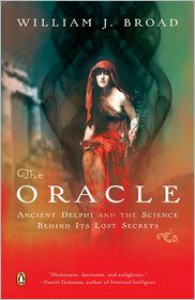 Fascinating.
Fascinating.This book is, for the most part, exactly what it says on the tin: a study of the science behind the Oracle of Delphi, specifically the huge inroads made by a team investigating in spurts over the last fifteen years. The Oracle explores how a century's worth of derision was overcome by methodical scientific discovery at the hands of a geologist and an archaeologist. In the end, they found support for the assertions of ancient Greek writers who insisted, time and again, that the Oracle breathed a sweet-smelling pneuma in preparations for religious rights, and that the tripod on which she sat was situated over a chasm in the earth. After a French expedition in the late 19th century, this was all dismissed as imaginings; the fissure discussed by Plutarch did not exist. Then geologist Jelle de Bour discovered not one fault line running directly under the temple at Delphi, but two...and they intersected directly under the adyton, where the Oracle carried out her rituals. Geologically speaking, Greece is a young country, still very active with earthquakes and moving plates. The fissure described time and again by ancient writers very likely did exist, and it is thought that a great earthquake (circa 373 BCE...also the beginning of the Oracle's decline) very probably closed the chasm that vented the gas (ethylene) that, in short, got the Oracle of Delphi high.
There's a lot more intricate science behind all of this, and the book goes into great detail without ever being dry or boring. The first chapter is an incredibly interesting history of the Oracle and the influence she held for many centuries over the developing Greek state. The following chapters focus on the modern science. This book was holding a solid four star rating in my head, right up until the end, when the author earned that final star:
William Broad summarizes that, although the discoveries in Delphi and the explanation of the gas vents that put the Oracle in a "trance" help identify a starting place of how the Oracle worked, that is all they did: pinpoint a starting place. Science can pinpoint where a fault line runs, where a crack in the earth may have been thousands of years ago, where springs once gushed abundantly into a temple courtyard, and what gases a priestess who lived long ago may have inhaled in order to achieve a religious trance, but science cannot account for the rest of the facts surrounding the Oracle of Delphi. Unveiling the ethylene that induced religious ecstasy does not explain the international reverence for the Oracle of Delphi, nor does it explain the sociological and religious reasons behind her continued influence even as other oracles rose and fell in prominence. She literally had the ability to overthrow kings, effect matters of state, and change the course of history. Science itself, in this reductionist form, cannot account for all that, as things that are beyond the effect of a gas vent. Because of this, the mystery of the Oracle of Delphi and her allure remain, despite recent scientific inroads into how she operated.
And for that open-minded recognition, Mr. Broad earned himself that fifth star. (I'm sure he's overjoyed.)
(And to prove just how much of a dork I am? Halfway through reading this, the names of the scientists - de Bour, Hale, Spiller, Chanton - were naggingly familiar, and I realized something: I saw the History Channel special on this same topic a couple years ago. It's well-worth watching, if you can find it on YouTube.)



